A quarter of a century on and history repeats itself. England are hosting the Euros, playing Scotland in the group stage, and football’s coming home again. In 1996, it came home for the first time. It was the first major tournament England had hosted since the World Cup victory of 1966. England fans also hoped it was coming home in the larger sense – that the country was going to win the European Championship and end 30 years of hurt. But despite the best efforts of a team fired by the maverick brilliance of Paul Gascoigne, England lost in the semi-final. On penalties, of course. To Germany, of course. Plus ça change, plus c’est la même chose.
Now it’s 55 years, and the clock still ticks away relentlessly, mockingly.
For England football fans of a certain age, Euro 96 was a golden age – or golden three weeks. For those like me, not quite old enough to remember the World Cup victory of 66 in real time, but old enough to remember all the false dawns and muted dusks, that summer was special. It wasn’t simply the achievement – after all, England reached semi-finals in 1990 and 2018 at the biggest tournament of them all, the World Cup, but neither resonated quite like 96. It was a coming together of all kinds of things – style, hope, politics, culture, commerce, sunshine, under the great brolly of international football. Twenty-five years on, might it just happen again?
It all started with the song. On 26 May 1996 Three Lions entered the charts at No 1. There were still two weeks to go till the tournament began. David Baddiel and Frank Skinner, two comedians who hosted the football magazine show Fantasy Football League, joined forces with The Lightning Seeds to record Three Lions. The band’s leader Ian Broudie had a knack of building choruses (“Three Lions on a shirt/Jules Rimet still gleaming/Thirty years of hurt/Never stopped me dreaming”) on top of choruses (“It’s coming home/It’s coming/Football’s coming home”) to create rousing anthems. And this was one of his best. But it was different from most football tournament songs. Three Lions wasn’t swaggering, it was melancholy. It was a song to be sung more in hope than expectation.
The song became associated with the national flag, but again it was different. This wasn’t the union flag with its jingoistic connotations, it was the St George’s flag. “What I notice most when I see footage of Wembley at Euro 96 is the flags and the joy,” Baddiel says today. “And then I am assailed by a depressing sense that those two things wouldn’t go together in the same way now. This was a specific moment; a particular window. The flags were being waved along with the singing of Three Lions and it created a very unusual thing – a non-aggressive, non-triumphalist patriotism. If you waved a St George flag to Three Lions, it didn’t feel like you were waving a symbol of nationalism and racism. It was a soft, sad type of pride being expressed, not a vanquishing, overcoming one.”
Now we are at war again, but today we are engaged in civil war, fighting each other over our polarised beliefs – Brexit, migration, wokeness. “Every action seems to operate as a node somewhere in the culture wars,” Baddiel says. “Too many people would simply see waving the flag as associated with a triumphant English nationalism that has resurfaced, and has had large political consequences, since 1996.”
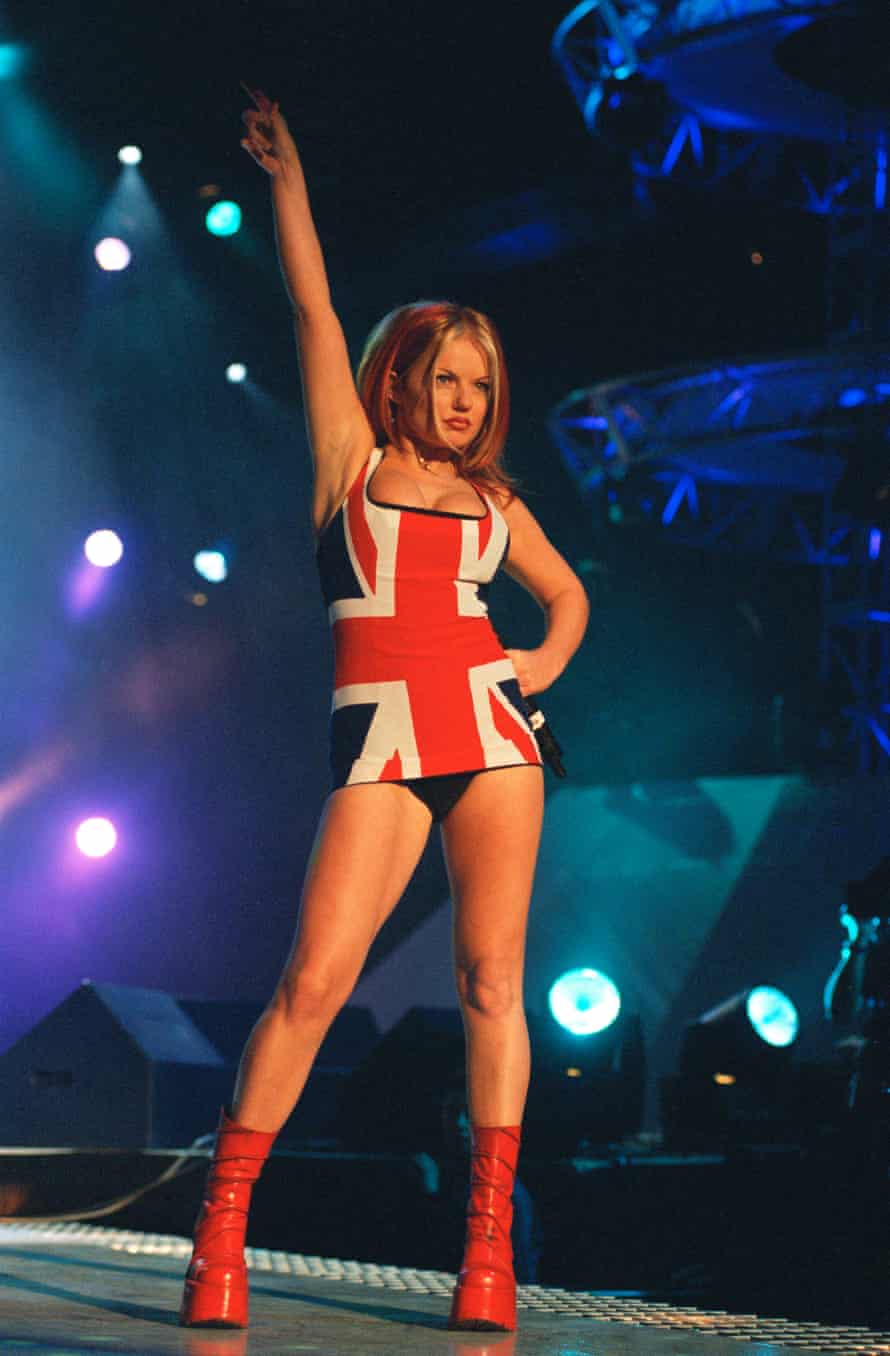
The expression “culture wars” was unknown in 1996, but culture was at the heart of everything. For the first time since the 1960s it felt that our culture was booming. Art and music didn’t just happen to be British, it was proudly trademarked as such. Oasis and Blur fought for supremacy in the charts, with music that was distinctively homespun. Blur created vignettes of traditional British life in songs such as Country House and Park Life, while Oasis quoted our own history back at us with Wonderwall (named after George Harrison’s first solo album) and Don’t Look Back in Anger (referencing John Osborne’s classic kitchen sink drama). Music even managed, temporarily, to take the bile our of the union flag. In 1996, Noel Gallagher played a Union Jack guitar at Manchester City’s Maine Road. A year later Geri Halliwell wore a Union Jack minidress at, you guessed it, the Brit Awards. Two decades later cultural commentators such as Jon Savage and John Harris asked whether Britpop had contributed to Brexit.
Meanwhile, British art became a movement its own right, championed by advertising guru Charles Saatchi. Sensation, the exhibition of works by the Young British Artists, crowned him as a visionary collector and the likes of Tracey Emin and Damien Hirst as serious artists. Two years after the Euros, Hirst had a hit record as a part of the trio Fat Les (alongside Blur’s Alex James and actor Keith Allen) with Vindaloo – the unofficial theme song to the 1998 World Cup. Again, football, art, branding and commerce were united.
The mid-90s was an astonishingly creative era. Two decades on, the same names are dominant in music and art. Britain is in a period of cultural stasis.
In the 1990s, football emerged from its decade of shame. The 1980s was marked by disaster after disaster: the Bradford fire of May 1985 killed 56 spectators, the Heysel tragedy only a couple of weeks later killed 39, and Hillsborough in 1989 killed 96. Football had come to be seen as a killing field. Margaret Thatcher believed the sport was a stain on her beloved nation; that it represented the very worst of British – feckless working-class youths who just wanted to fight.
Her government tried to introduce identity cards and considered banning away fans, it fenced football fans in like animals, to horrific effect at Hillsborough. Football became a pariah; not a subject fit for polite society. After Heysel, English clubs were banned from Europe, domestic gates fell drastically, nobody wanted to be associated with football except the diehard fans.
But by 1996, its image had turned full circle. Football was now regarded as part of our rich cultural package – a great British export. (A year later, new prime minister Tony Blair officially united sport and culture by creating the Department for Culture, Media and Sport.) We were four years into the Premier League, and TV money was transforming a sport and a lifestyle that even the politicians bought into.
The Fiver: sign up and get our daily football email.
There is a wonderful news clip from October 1995 of Blair and Kevin Keegan at a leisure centre in Brighton. Both have removed their suit jackets to play head tennis, and you never saw a more painfully focused Blair, as the ball bobbed back and forth between him and Keegan. It wasn’t simply a matter of saying he was a football fan, he had to show that he loved the game, he played it, he had skills. You felt the New Labour machinery had tallied the number of votes 10 head tennis exchanges with Keegan were worth. In the end Blair managed 27. He had passed as a genuine football fan.
“By 96 when that tournament was going on we were well ahead in the polls,” says Alastair Campbell, Blair’s former communications director. “People were expecting us to win, so the political mood was all about New Labour and Tony.”
After 17 years of Tory rule, perhaps the only thing that could stop them apart from a massive Blair scandal was football. An England victory at the Euros could change the mood of the country.
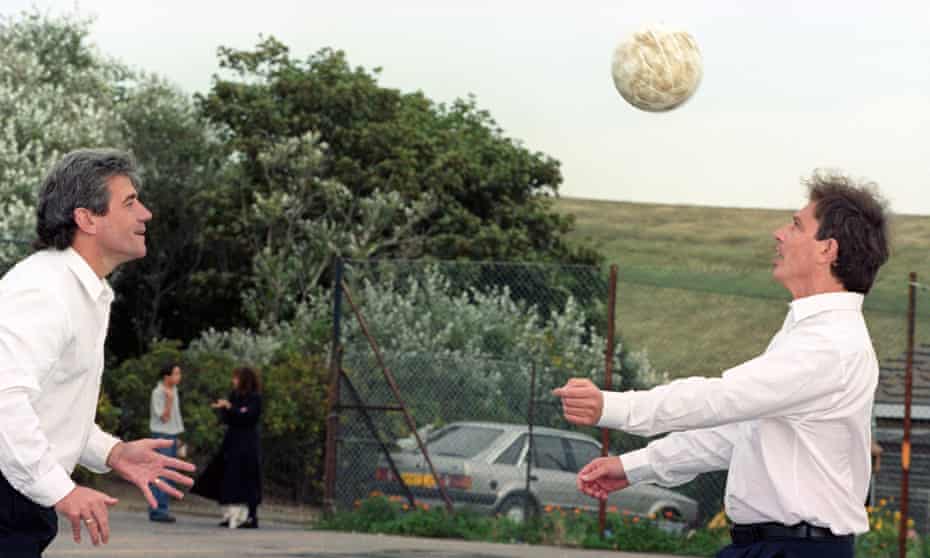
Campbell admits he was hardly loyal to England in 1996. First, despite being born in England he was a Scotland fan. And second, there was politics. “I was at the Germany game with Tony Blair. John Major was in the front row, Tony was in the second row and I was at the back with this Scottish Special Branch guy. Being absolutely frank, I wanted Germany to win, mainly because the Tories were so desperate for England to win it. As we got out of the ground Tony said to me can you at least try to look a little bit pissed off. I got in the car and punched the roof and said ‘Jetzt sind die Tories absolut gefuckt mein Kapitän’.” He howls with laughter.
It’s tempting to think of this as a more innocent time in politics and football, Campbell says, but it wasn’t. “Don’t forget Tony became leader on the back of John Smith dying and everybody said John’s death was going to lead to a kinder, gentler politics, but it didn’t happen.” As for football, big money was now running the game. The previous season, 1994-95, Blackburn had come from nowhere to win the Premier League because they were bankrolled by local steel magnate Jack Walker.
Campbell says one of the things he remembers most clearly from this period is how everything was meshing. Britpop helped define the Euros, and a few months later Blair was in power piggybacking on the appeal of all things British. The era became known as Cool Britannia, not least because Blair invited the likes of Noel Gallagher to a party at No 10 three months after winning power. “The Cool Britannia thing wasn’t a strategy, by the way. Newsweek did a headline and it just stuck,” he says.
Campbell is flicking through his diaries for 1996. “Oh, here’s a good one. ‘November 5; good meeting with Alan McGee and Tony Saunders of Creation Records. They could get Noel Gallagher to do stuff for us but wanted us to take the music industry seriously as industry. We agree to organise a business meeting on that theme. They felt it was better to keep Liam away from Tony, but Noel’s got his shit together, he said.’ When we got into power and had that party at No 10 Noel was the one who came because Alan McGee said you don’t want Liam there, he’ll cause trouble. I’d forgotten that. That was in opposition I was seeing Alan McGee.”
He continues flicking. “For the Labour party conference that year the top line I designed for Tony’s speech was ‘Labour’s coming home’.” Here it is. “September 29: Still arguing with Gordon Brown over Labour’s coming home. He said he was really pissed off about it cos he wanted to do the same.’” Even before Labour got into power, Blair and Brown were cat-fighting over headlines. “He wanted to use it and I said it was more important Tony used it because he’s the leader and you’re not. That was the headline in a lot of papers the next day – Labour’s coming home. It was a straight lift. So even though England hadn’t won the tournament it was still playing into that mood that had been created.”
The idea of politicians paraphrasing a football song to win votes would have been laughed out of the Commons in the eighties. The sport’s nadir was the Hillsborough disaster. After the Taylor report into the tragedy was published in January 1990, standing was banned in the two top tiers of English football. That summer the World Cup was held in Italy. Not only did England reach the semi-final, but football seemed newly exotic.
“Italia 90 was a glamorous, glossy tournament, and they have Nessun Dorma as the theme tune,” says commercials director Theo Delaney, who hosts the football podcast Life Goals. “Suddenly the middle classes wake up and think I rather like this – Italy, Pavarotti, we’re winning, and we’ve got this fellow Gazza who seems awfully good!” In 1992, Nick Hornby’s football memoir Fever Pitch, about his love affair with Arsenal, became a bestseller. The following year poet and Spurs fan Ian Hamilton wrote Gazza Agonistes, an extended profile of Paul Gascoigne for Granta, with a lofty nod to Milton in its title. Football was now a muse for literary types.
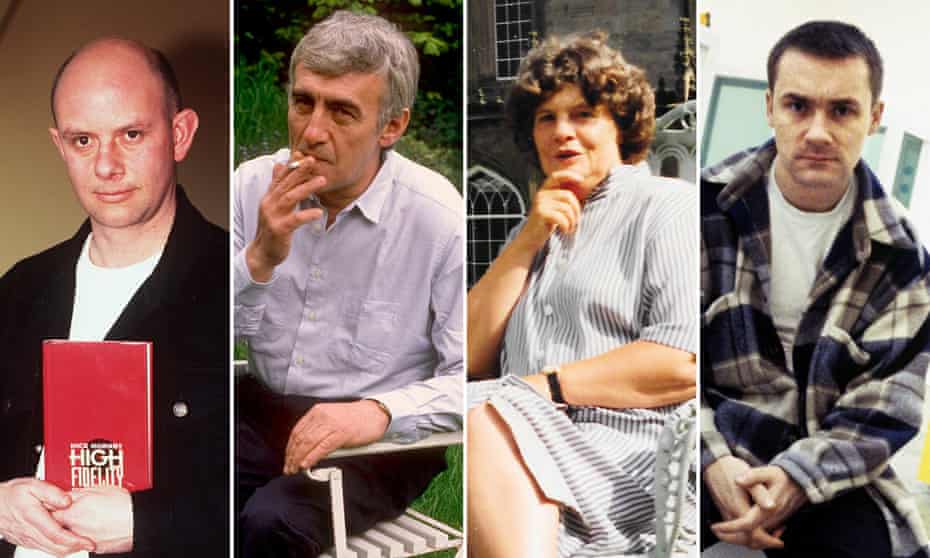
Football, like the Labour party, was being repackaged for the professional classes. The Premier League was sold upmarket – more expensive seats, greater comfort and safer. There was a new audience of armchair viewers willing to pay a premium for a subscription to Sky Sports (then BSkyB). Whereas when I was growing up you would see highlights from a few matches a week on TV, now you could see any number of live matches – if you were willing to stump up the cash. The advertising money from Sky and the glamour of the Premier League attracted the world’s best players.
Delaney was already aware of how much football had changed because of the impact it had on his work. In the 1980s, the only commercials made about football were encouraging fans to go to games. Football was bringing the bacon home for the advertising industry – literally so for Delaney who made Danepak commercials featuring Denmark and Manchester United goalkeeper Peter Schmeichel. “I was making football ads all the time by the nineties. If you were a commercials director who knew about football, it was a bloody brilliant time.” Football and advertising were now umbilically linked. Sky paid the football clubs for the right to screen matches from its advertising (and subscription) revenue, while the footballers flogged products in their commercials. The initial five-year deal, for what now seems a mere £304m, ended in 1997. Now Sky, BT and Amazon pay a combined £4.8bn over three years to screen live matches.
As Delaney was walking to the stadium for England’s semi-final against Germany, football’s new demographic really struck him. “I was with my brother Caspar and a photographer called Andrew Douglas, all of us in the advertising business. We walked up Wembley Way and the first person we saw and recognised was AS Byatt. Andrew recognised her because he had taken her portrait for the Observer, and he went ‘AS, AS!, what are you doing here?’ And she said ‘I’m writing a piece for one of the papers because I’ve never been to a football match and they’ve sent me’. Then we bumped into Paul Smith, the designer. These were people who would not have been at any kind of football match in the eighties. Another guy who went was one of the creative directors at Saatchi’s. He was actually a minor aristocrat, and he turned up late with a bunch of people from the agency and said ‘Oh, do we have to wait for the interval before we go in?’ because he’d only ever been to the opera and theatre!”
The players themselves were a mix of the old and new. Most were model modern professionals. And then there were old schoolers like Tony Adams and Gascoigne – players who could binge on burgers, drink themselves into a stupor, smoke themselves hoarse and still turn on the style a few hours later. Adams, a recovering alcoholic who founded the addiction clinic Sporting Chance, famously went on a seven-week bender after the tournament.
Euro 96 could so easily have ended in disaster. It started with a drab 1-1 draw against Switzerland – a match England were expected to win. Next up was the auld enemy Scotland. England were 1-0 up when Scotland won a penalty in the 78th minute. If Gary McAllister had scored, England would have been in danger of falling at the first hurdle – not making it out of the group stage and being banished from their own tournament. But David Seaman saved it.
A minute later Gascoigne did the unthinkable. He received a cushioned pass from midfielder Darren Anderton, flicked the ball over the head of confounded defender Colin Hendry and volleyed it into the corner of the net. The players celebrated by re-enacting “the dentist’s chair”. Gascoigne lay on the ground with his mouth open while players squirted a water bottle into his open mouth. The celebration was itself a tribute to another celebration – of Gascoigne’s birthday in Hong Kong a few weeks earlier. On that occasion members of the England squad ended the night participating in a notorious ritual at a local bar known as the dentist’s chair.
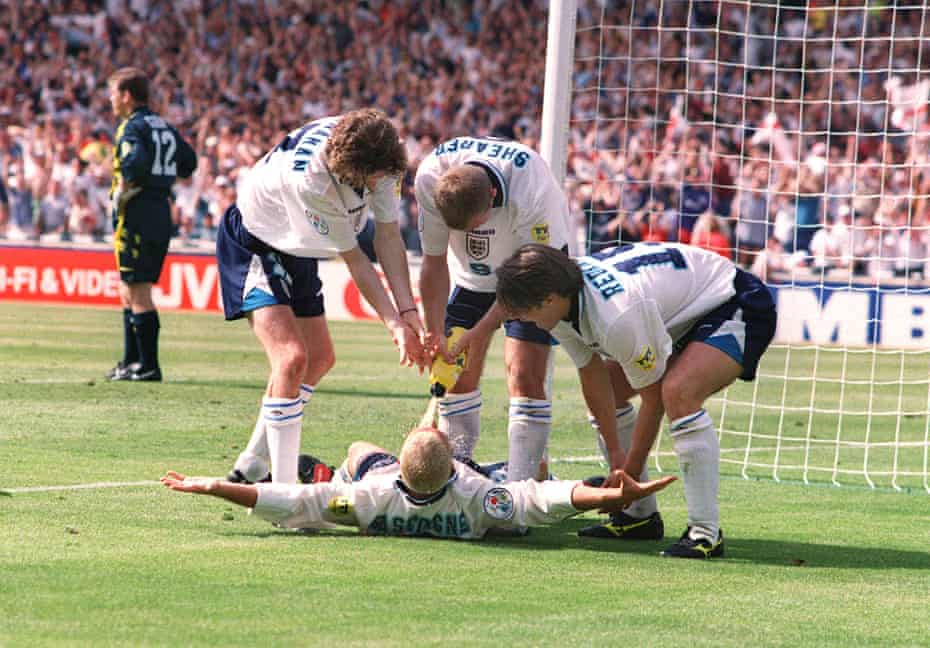
Anderton, aged 49, now lives in California with his wife. Last month they had their first child, a boy called Jack. As soon as he starts talking about Euro 96, it’s obvious how much it means to him. “The crowds, the song, the goals, the pre-tournament. Everything. Apart from losing to Germany in the semi-finals, there is nothing but positive memories.”
What is his strongest memory? “Probably the Gazza goal. That changed the whole tournament for us.” Anderton has good reason to remember the dentist’s chair celebration. As well as providing the vital pass for the goal, he had been there on the night. “There were five or six of us. Just madness. The great thing was that Gazza being the main man got all the abuse for the dentist’s chair because he was at the centre of everything. He just got on with it and he always answered on the football pitch.” What did the ritual involve exactly? “We’d had a few drinks and somebody said let’s have a go at this dentist’s chair thing, and they just sit us in the chair and pour a couple of bottles of whatever it is [Drambuie and tequila] in to your mouth. I met a couple of people who ran the bar a bit ago and they were mortified it had come out. One of their staff had stitched the lads up. We got a hell of a lot of grief about it till that goal.”
It sounds like a good night out? “One of the best!” he says.
After the Gascoigne goal, Anderton says the whole nation was behind the team. “As we took the road to Wembley from Burnham Beaches where we were staying, more and more fans were on the route, more flags, and once we got to the quarters-finals and semi-finals it was literally the whole route going down the M4. I don’t know what rock stars feel like but it must have been a bit like that.”
How much did the manager, Terry Venables, contribute to the mood? “He was the whole reason, to me. His man-management of players, situations, media was the best. He’s a proper human being who on top of it all was a genius when it came to managing a football team.”
And there was the song. The squad played it as they approached Wembley. They listened to it on the field before the match, and against the Netherlands when England played arguably their greatest tournament football since 1966, Anderton found himself joining the chorus while playing. “Normally when you play for England you enjoy it as best you can, but the reality is there’s a lot of pressure and stress. But when you’re 4-0 up at Wembley [final score 4-1] in the European Championship against an unbelievable Netherlands team, with 80,000 singing Football’s Coming Home, the adrenalin is so amazing. You can run all day, you don’t want the game to end, it’s just the perfect football match that you dream of all your life. In the second half, I was actually humming along to the song while playing. ”
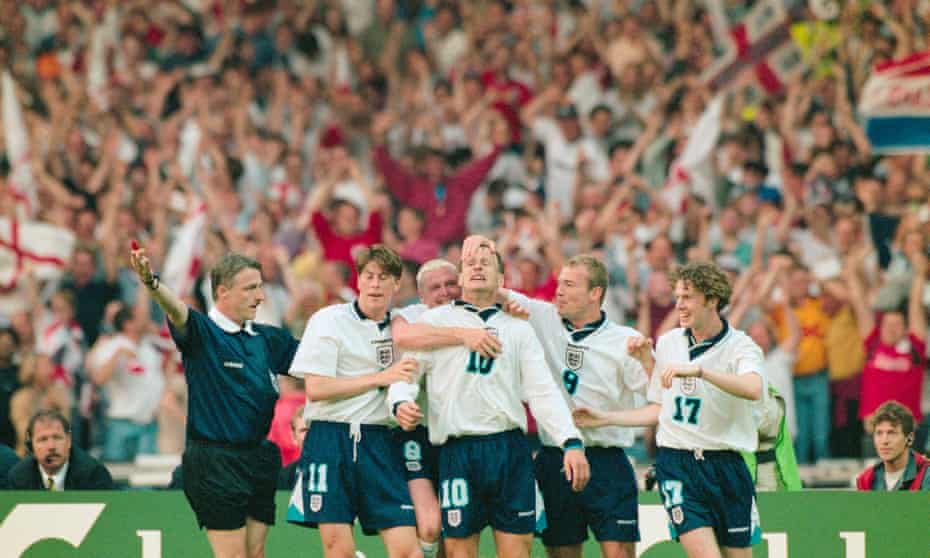
Twenty five years on, England and English football feel so different. The England squad is one of the most talented this country has produced – a reflection of the quality needed for homegrown players to compete with foreign imports in the Premier League. But the optimism of 1996, partly founded on the belief that finally a change was gonna come, is long gone. Many people argue that Blair’s “third way” ultimately entrenched neo-liberal politics.
Today the dominant mood is of fatigued cynicism. “I’ve just published my latest diaries and called it The Rise and Fall of the Olympic Spirit,” Campbell tells me. Anderton believes that while modern football is technically better, it’s duller. “I think it was more entertaining then, but I’m biased – I loved playing in that era. A lot of games now the first 10 minutes is just keeping the ball, and it’s like a practice match.”
As for Delaney, he still loves football but is disillusioned with the Premier League and his club Spurs. His latest film was made for the Tottenham Hotspur Supporters’ Trust and is called An Open Letter to the Board. “We’re saying to the board enough is enough – you tried to move us to Stratford, you tried to put staff on the furlough scheme when the pandemic started, you signed up to the European Super League, you charge us the highest price for tickets in Europe, and enough is enough. We want proper representation on the board. The owners think ‘fuck the “legacy” fans; they are not as lucrative as what the potential international TV audience would be if they could make sure the big clubs just play each other every week’. It’s gone too far.”
But not all the changes since 1996 are negative. Plans for the Super League were defeated by fan power. And there is a new spirit of resistance, not just from supporters but also players. Today’s footballers are empowered by huge social media followings, and are vocal about the need for change. Players such as Marcus Rashford and Raheem Sterling experienced poverty, racism and punitive austerity cuts as youngsters, and they’re not prepared to see the next generation suffer like they did.
Rashford forced Boris Johnson’s Conservative government into successive U-turns on free school meals. Now he’s campaigning to boost child literacy among the country’s disadvantaged children. And, as he told me last month, he’s far from done. “This is only the beginning. I expect to push a lot further than where we are now.” In the 1990s politicians reshaped football. Now footballers are reshaping politics. Nobody could have imagined that in 1996.
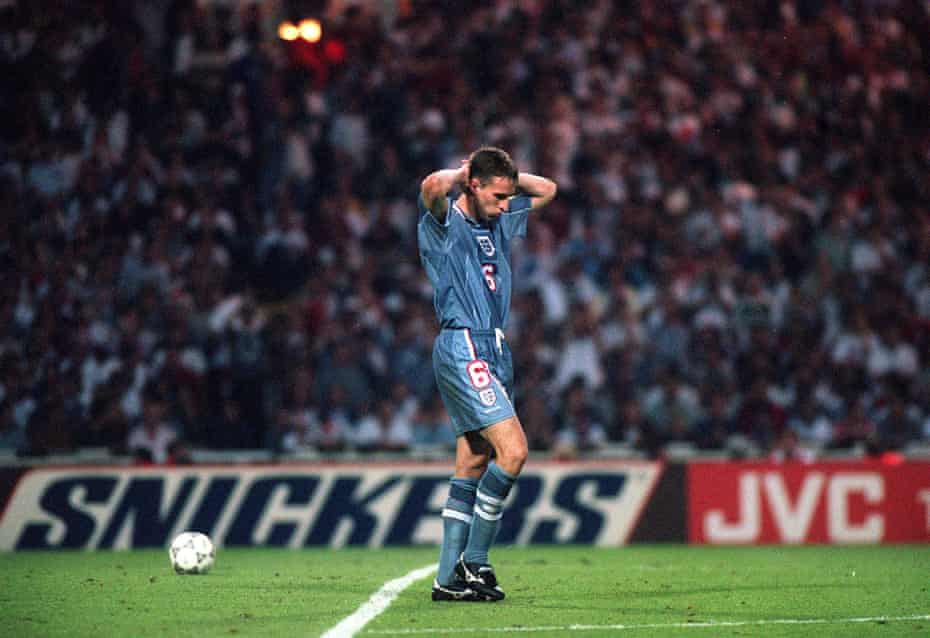
And then there is the pandemic. Again, nobody could have foreseen back then that Britain would be locked down for the best part of a year. But finally there is hope that the country can return to some kind of normal. Delaney says that despite, or perhaps because of, all that’s happened recently, if things go well on the pitch we may well see a return of the spirit of 96. “It can happen again. We’re coming out of the pandemic so everybody’s up for a party. Football is so simple. We all moan and grumble, but really it’s only about one thing, and that’s winning.” Or, in England’s case, almost winning.
from Football | The Guardian https://ift.tt/3gh1YcG
via IFTTT

No Comment